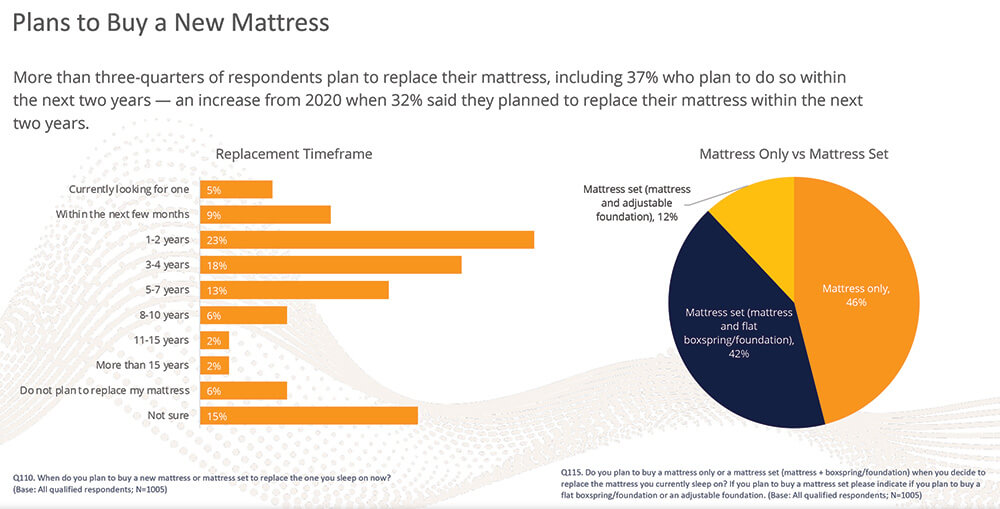Majority say they plan to buy mattress along with some type of base.

More than three-quarters of consumers plan to replace their current mattress, including 37% who plan to do so within the next two years, new research reveals.
And a majority of consumers say they plan to buy a mattress and an adjustable bed base (12%) or a mattress with a flat box spring or foundation (42%). That leaves 46% of consumers who say they plan to buy only a new mattress.
Plans to buy a new mattress are an important indicator for the mattress industry, as they identify sales that are imminent or could be coming in the near term.
The Better Sleep Council’s latest consumer survey, conducted last year, updates consumer attitudes on a number of key mattress issues, including plans to buy a new mattress. It found an increase in five percentage points from 2020 — to 37% — in the number of consumers who plan to replace their current mattress within the next two years.
“That 5 percentage point increase would provide a significant boost in business for the mattress industry, and it would also be beneficial for the many consumers who sleep on mattresses that are long past their prime,” says Mary Helen Rogers, vice president of marketing and communications for the International Sleep Products Association. The BSC is the consumer education arm of ISPA.
The latest research notes that 5% of consumers say they are currently looking for a new mattress to replace the one they are sleeping on, with 9% saying they plan to buy within the next few months. Another 23% of consumers say they plan to buy a new mattress in one to two years, and 18% say they plan to buy in three to four years.
Only 6% of consumers say they do not plan to replace their mattress, while 15% said they aren’t sure.
The consumers say they are willing to spend a mean of $1,171 for their next mattress or set. And almost two in 10 consumers (17%) say they are willing to spend $2,000 or more for their next mattress or set.
The research also provides a demographic breakdown of consumers’ mattress budgets, finding that older consumers generally say they would be willing to spend more than younger consumers.
For example, 40% of baby boomers say they would be willing to pay from $1,000 to $1,999 for a new mattress or set — the highest of any demographic group. Only 17% of Gen Z consumers would be willing to spend that amount, compared with both 32% for millennials and Gen X consumers.
On the bottom end of the price spectrum, 38% of Gen Z consumers say they would be willing to pay less than $400 for a new mattress or set, while just 10% of boomers share that view.
“Millennials’ professed interest in buying king or California king models is an interesting finding.”
The research breaks out the amounts consumers would spend for a mattress set. Consumers say the maximum amount they would be willing to spend is $1,587 for a king set, $1,055 for a queen set, $952 for a full set and $742 for a twin set.
Looking at the sizes of mattresses they plan to buy, 55% of millennials say they plan to buy a king or California king model, by far the highest percentage of any demographic group. Forty-one percent of Gen Z consumers plan to buy a king or California king, while 43% of Gen X consumers and 33% of boomers share those size plans.
“Millennials’ professed interest in buying king or California king models is an interesting finding,” Rogers says. “Perhaps that indicates that those consumers are spending more time in their beds with other family members and pets and see the benefits of larger mattresses.”
The survey also asked consumers about their comfort in making larger household purchases. It found that consumers last year were slightly less comfortable about making those purchases, which would presumably include mattresses, than they were in 2020.



